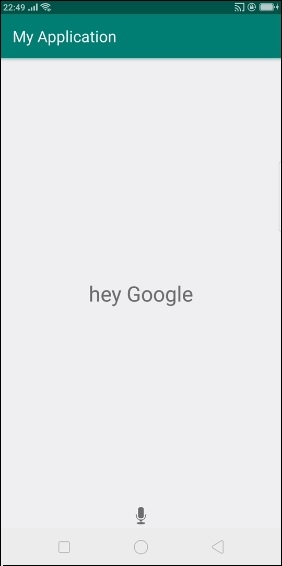如何集成 Android 语音到文本?
Android 使用 RecognizerIntent.ACTION_RECOGNIZE_SPEECH 支持 Google 内置的文本转语音 API。本示例演示了如何集成 Android 语音到文本。
步骤 1 - 在 Android Studio 中创建一个新项目,转到文件 ⇒ 新建项目,并填写所有必需的详细信息以创建新项目。
步骤 2 - 将以下代码添加到 res/layout/activity_main.xml。
<?xml version = "1.0" encoding = "utf-8"?> <RelativeLayout xmlns:android = "http://schemas.android.com/apk/res/android" xmlns:app = "http://schemas.android.com/apk/res-auto" xmlns:tools = "http://schemas.android.com/tools" android:layout_width = "match_parent" android:layout_height = "match_parent" tools:context = ".MainActivity"> <LinearLayout android:layout_width = "match_parent" android:gravity = "center" android:layout_height = "match_parent"> <TextView android:id = "@+id/text" android:textSize = "30sp" android:layout_width = "wrap_content" android:layout_height = "wrap_content"/> </LinearLayout> <LinearLayout android:layout_width = "wrap_content" android:layout_alignParentBottom = "true" android:layout_centerInParent = "true" android:orientation = "vertical" android:layout_height = "wrap_content"> <ImageView android:id = "@+id/speak" android:layout_width = "wrap_content" android:layout_height = "wrap_content" android:background = "?selectableItemBackground" android:src = "@android:drawable/ic_btn_speak_now"/> </LinearLayout> </RelativeLayout>
在上述代码中,我们创建了一个文本视图和一个图像视图。当用户点击图像视图时,它将调用 Google 语音到文本 API 并将文本添加到文本视图中。
步骤 3 - 将以下代码添加到 src/MainActivity.java
package com.example.andy.myapplication;
import android.content.ActivityNotFoundException;
import android.content.Intent;
import android.speech.RecognizerIntent;
import android.support.v4.widget.SwipeRefreshLayout;
import android.support.v7.app.AppCompatActivity;
import android.os.Bundle;
import android.view.View;
import android.widget.ImageView;
import android.widget.TextView;
import android.widget.Toast;
import java.util.ArrayList;
import java.util.Locale;
public class MainActivity extends AppCompatActivity {
private final int REQ_CODE = 100;
TextView textView;
@Override
protected void onCreate(Bundle savedInstanceState) {
super.onCreate(savedInstanceState);
setContentView(R.layout.activity_main);
textView = findViewById(R.id.text);
ImageView speak = findViewById(R.id.speak);
speak.setOnClickListener(new View.OnClickListener() {
@Override
public void onClick(View v) {
Intent intent = new Intent(RecognizerIntent.ACTION_RECOGNIZE_SPEECH);
intent.putExtra(RecognizerIntent.EXTRA_LANGUAGE_MODEL,
RecognizerIntent.LANGUAGE_MODEL_FREE_FORM);
intent.putExtra(RecognizerIntent.EXTRA_LANGUAGE, Locale.getDefault());
intent.putExtra(RecognizerIntent.EXTRA_PROMPT, "Need to speak");
try {
startActivityForResult(intent, REQ_CODE);
} catch (ActivityNotFoundException a) {
Toast.makeText(getApplicationContext(),
"Sorry your device not supported",
Toast.LENGTH_SHORT).show();
}
}
});
}
@Override
protected void onActivityResult(int requestCode, int resultCode, Intent data) {
super.onActivityResult(requestCode, resultCode, data);
switch (requestCode) {
case REQ_CODE: {
if (resultCode = = RESULT_OK && null ! = data) {
ArrayList result = data
.getStringArrayListExtra(RecognizerIntent.EXTRA_RESULTS);
textView.setText(result.get(0));
}
break;
}
}
}
}在上面的代码中,当用户点击 imageview 时,它将调用如下所示的 intent -
Intent intent = new Intent(RecognizerIntent.ACTION_RECOGNIZE_SPEECH);
intent.putExtra(RecognizerIntent.EXTRA_LANGUAGE_MODEL, RecognizerIntent.LANGUAGE_MODEL_FREE_FORM);
intent.putExtra(RecognizerIntent.EXTRA_LANGUAGE, Locale.getDefault());
intent.putExtra(RecognizerIntent.EXTRA_PROMPT, "Need to speak");
try {
startActivityForResult(intent, REQ_CODE);
} catch (ActivityNotFoundException a) {
Toast.makeText(getApplicationContext(), "Sorry your device not supported", Toast.LENGTH_SHORT).show();
}在上面的代码中,我们调用了 Google API,并将结果获取到 onActivityResult() 中,如下所示 -
@Override
protected void onActivityResult(int requestCode, int resultCode, Intent data) {
super.onActivityResult(requestCode, resultCode, data);
switch (requestCode) {
case REQ_CODE: {
if (resultCode = = RESULT_OK && null ! = data) {
ArrayList result = data
.getStringArrayListExtra(RecognizerIntent.EXTRA_RESULTS);
textView.setText(result.get(0));
}
break;
}
}
}在上面的代码中,我们将结果作为数组列表获取,因此我们从数组列表中获取第零个位置并将其追加到文本视图中。
让我们尝试运行您的应用程序。我假设您已将您的实际 Android 移动设备连接到您的计算机。要从 android studio 运行应用程序,请打开您项目的其中一个活动文件,然后单击工具栏中的运行![]() 图标。选择您的移动设备作为选项,然后检查您的移动设备,它将显示您的默认屏幕 -
图标。选择您的移动设备作为选项,然后检查您的移动设备,它将显示您的默认屏幕 -

当用户点击麦克风按钮时,它将调用 Google API,如下所示 -

现在我们输入了“Hey GOOGLE”。它将追加结果,如下所示 -

点击 此处 下载项目代码

广告

 数据结构
数据结构 网络
网络 关系型数据库管理系统
关系型数据库管理系统 操作系统
操作系统 Java
Java iOS
iOS HTML
HTML CSS
CSS Android
Android Python
Python C 语言编程
C 语言编程 C++
C++ C#
C# MongoDB
MongoDB MySQL
MySQL Javascript
Javascript PHP
PHP